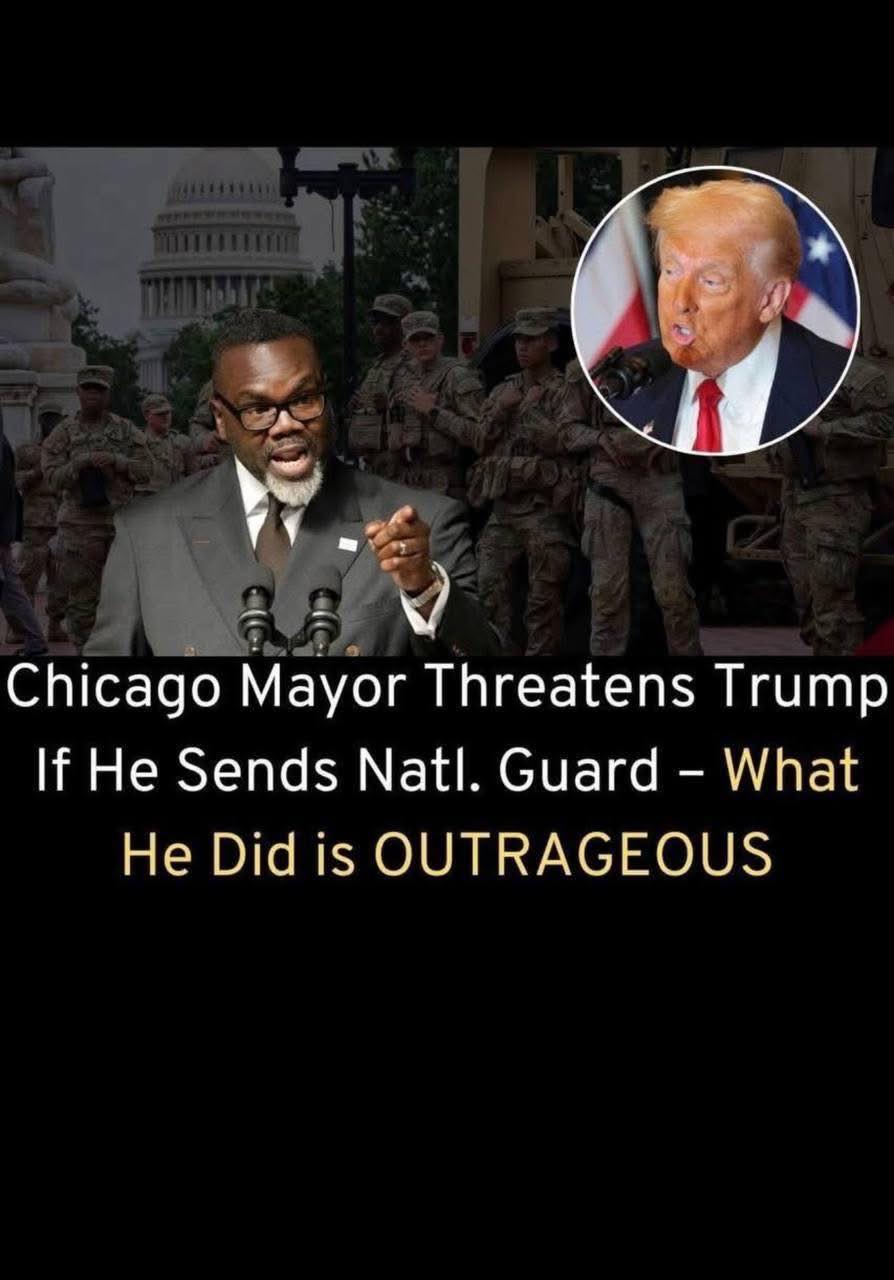CHICAGO — Mayor Brandon Johnson issued a fiery rebuke this weekend to President Donald Trump’s suggestion that Chicago could be the next city to receive a federal law enforcement surge, including possible National Guard deployment. In remarks to MSNBC, Johnson warned that the people of Chicago would “rise up” against what he described as an authoritarian attempt to militarize the city.
The exchange adds a fresh flashpoint to the ongoing national debate over the federal government’s role in policing local crime, as city and state leaders push back against the Trump administration’s increasingly aggressive posture.
Trump Signals Chicago as Next Target
During a Saturday press availability, Trump floated Chicago as a candidate for his “enhanced enforcement initiative,” a program that has already seen federal agents surge into several cities as part of what the White House calls a crime crackdown. While details were vague, the president suggested that persistent violent crime in Chicago demanded a “strong federal response.”
The comment was met with immediate resistance from Illinois Governor J.B. Pritzker and Mayor Johnson. Pritzker dismissed the move as a “manufactured crisis” intended to score political points rather than address community safety.
Johnson’s words were sharper.
“The City Does Not Need a Military-Occupied State”
Speaking on MSNBC, the Chicago mayor denounced the proposal as an affront to local sovereignty.
“The city of Chicago does not need a military-occupied state. That’s not who we are,” Johnson said. “We are not going to allow federal agents or troops to treat our communities like war zones.”
Johnson framed the issue as one of both principle and history. “The people of this city are accustomed to rising up against tyranny,” he declared. “If that’s necessary, I believe the people of Chicago will stand firm alongside me as I work every single day to protect the people of this city.”
Linking Arms with Los Angeles
Johnson also drew parallels to the resistance voiced by Los Angeles Mayor Karen Bass, who clashed with the Trump administration earlier this year over the withdrawal of federal protections for former Vice President Kamala Harris.
“I commend the work of Mayor Bass, my colleague, and all the folks in Los Angeles who stood up and fought against authoritarianism,” Johnson said. “Here’s the bottom line: they don’t have police power. There’s nothing they can do.”
The suggestion is that while federal authorities can send in agents or troops under certain statutes, their ability to police daily life is limited without coordination with local governments.
Legal Battle on the Horizon
Johnson hinted at legal action should the White House attempt to unilaterally send National Guard forces or additional federal agents into Chicago. “We’ll take legal action,” Johnson promised, noting that courts have historically sided with local jurisdictions when federal overreach is alleged.
Illinois Attorney General Kwame Raoul has not yet commented on possible legal maneuvers, but state officials have previously argued that uninvited federal deployments raise constitutional questions.
Chicago’s Crime Challenge
The clash comes as Chicago continues to wrestle with persistent violent crime. While overall crime statistics show some year-to-year fluctuations, high-profile shootings and carjackings have kept public safety at the forefront of city politics.
Trump and his allies have often singled out Chicago as emblematic of what they describe as Democratic mismanagement of urban centers. Johnson counters that the administration is using the city as a political punching bag rather than seriously engaging with underlying issues of poverty, inequality, and community disinvestment.
“Our city is one of the most diverse economies in the world,” Johnson said. “A city founded and established on the values of working people. We’re not going to surrender our humanity to this tyrant.”
The Political Stakes
The standoff also carries major political implications. Trump has increasingly used federal crime policy as a wedge issue, framing Democratic-led cities as unsafe and in need of federal intervention. For mayors like Johnson, the risk lies in being painted as resistant to law and order — even as they attempt to defend local control.
Pritzker and Johnson appear determined to stand united. The governor’s office issued a statement on Sunday reiterating that Illinois “will not be intimidated into abandoning its constitutional authority over law enforcement.”
Echoes of 2020
The prospect of federal intervention in Chicago recalls the summer of 2020, when then-President Trump deployed federal agents to Portland, Oregon, to protect federal buildings during protests. Critics at the time accused federal forces of heavy-handed tactics, including unmarked vehicles and aggressive crowd control measures.
Johnson suggested Chicago would not tolerate a repeat. “We are not going to let this administration treat our neighborhoods as staging grounds for political theater,” he said.
Rising Tensions, Uncertain Future
As of now, no federal order has been signed authorizing a deployment to Chicago, and it remains unclear how serious Trump is about following through. Still, the mayor’s vow that the city will “rise up” if troops are sent reflects how tense the political atmosphere has become.
Legal experts say the White House could attempt to use statutes allowing federal intervention in cases of insurrection or obstruction of federal law, but those powers are rarely invoked and usually face immediate legal challenge.
For now, the debate remains rhetorical. But with violent crime still a hot-button issue and Trump signaling more aggressive moves, the possibility of a federal-local showdown in Chicago looms large.
Conclusion
Mayor Brandon Johnson’s comments mark a bold rejection of federal encroachment and set the stage for a potential legal and political confrontation with the Trump administration. By invoking the city’s tradition of “rising up,” Johnson positioned Chicago not just as a battleground over crime policy, but as a symbol of resistance to what he frames as authoritarian overreach.
Whether Trump follows through or not, the confrontation highlights a deeper struggle over the balance of power between Washington and America’s cities — a struggle that could shape the political and legal landscape in the months ahead.
